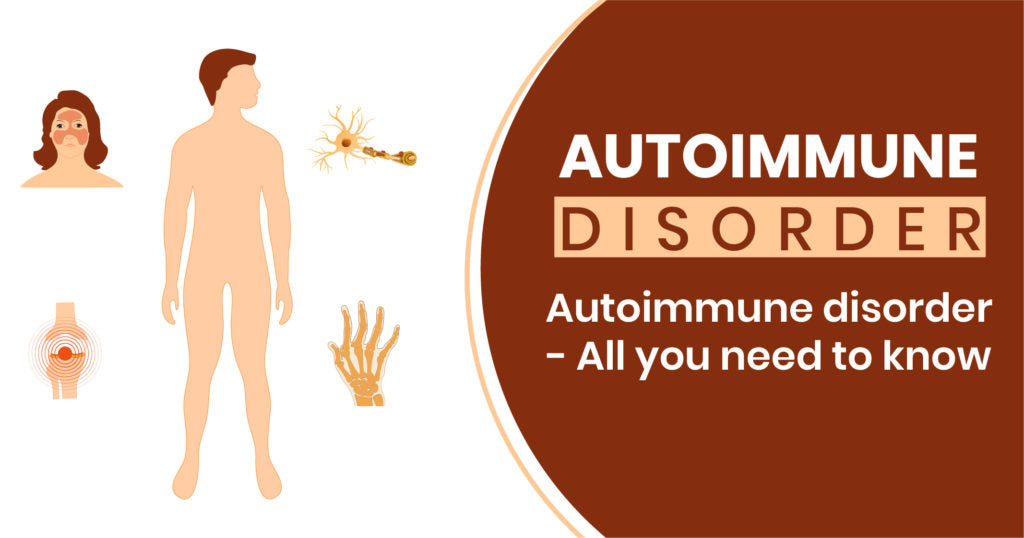
AYURVEDA AND AUTOIMMUNE DISEASES
Share
Autoimmune diseases are a complex group of disorders where the immune system mistakenly targets and attacks healthy cells and tissues in the body. These conditions can lead to chronic inflammation and a wide range of symptoms affecting various organs and systems. Ayurveda, an ancient system of traditional medicine that originated in India thousands of years ago, offers a holistic approach to understanding and managing autoimmune diseases. In this comprehensive exploration, we delve into the principles of Ayurveda, its view on autoimmune diseases, and how Ayurvedic treatments and lifestyle practices can complement modern medicine in managing these conditions.

Understanding Ayurveda
Ayurveda, often referred to as the "Science of Life," is a holistic healing system that emphasizes balance and harmony within the body, mind, and spirit. It is deeply rooted in the philosophy that health is a state of equilibrium, and illness arises when this balance is disrupted. Ayurveda recognizes that each individual is unique, with their own distinct constitution (Prakriti), and seeks to address the root causes of disease rather than just managing symptoms.
Key Principles of Ayurveda
To understand how Ayurveda approaches autoimmune diseases, it's essential to grasp some of its fundamental principles:
The Five Elements: Ayurveda is based on the concept of the five elements—earth, water, fire, air, and ether—each of which corresponds to specific qualities and functions in the body.
Three Doshas: Ayurveda categorizes individuals into three doshas or constitutions: Vata (dominated by air and ether), Pitta (dominated by fire and water), and Kapha (dominated by earth and water). These doshas influence an individual's physical, mental, and emotional characteristics.
Prakriti and Vikriti: Prakriti refers to an individual's innate constitution, while Vikriti pertains to their current state of health or imbalance. Ayurvedic diagnosis and treatment are based on assessing both Prakriti and Vikriti.
Agni (Digestive Fire): Good digestion is central to Ayurveda. An impaired digestive fire can lead to the accumulation of toxins (ama) and contribute to various health issues.
Ayurveda and Autoimmune Diseases
Autoimmune diseases are seen in Ayurveda as disorders related to immune system dysfunction and inflammation. While Ayurveda doesn't use modern medical terminology, it does have its own concepts and explanations for these conditions.
Aggravation of Doshas: Ayurveda attributes autoimmune diseases to the imbalance and aggravation of doshas. Depending on the specific autoimmune condition, imbalances in Vata, Pitta, or Kapha doshas may be involved.
Toxin Accumulation: Ayurveda places great emphasis on the concept of toxins or ama. Accumulation of ama in the body is believed to trigger autoimmune responses and chronic inflammation.
Weakened Agni: Impaired digestive fire (agni) can lead to undigested food particles and toxins entering the bloodstream, further contributing to autoimmune conditions.
Ojas Depletion: Ojas is considered the essence of vitality and immunity in Ayurveda. Autoimmune diseases are often associated with reduced ojas, leaving the body susceptible to illness.
Ayurvedic Approach to Autoimmune Disease
Ayurveda offers a multifaceted approach to managing autoimmune diseases. It aims to restore balance, remove toxins, and strengthen the body's natural defenses. Here are some key components of Ayurvedic treatment for autoimmune conditions:
Dietary Modifications: Ayurveda places significant importance on diet. Individuals with autoimmune diseases are often advised to follow an anti-inflammatory diet tailored to their dosha, emphasizing whole, unprocessed foods, and avoiding trigger foods.
Herbal Remedies: Ayurvedic practitioners may prescribe specific herbal formulations to address the underlying imbalances associated with autoimmune conditions. Herbs like Turmeric, Ashwagandha, and Guggul are commonly used for their anti-inflammatory and immune-modulating properties.
Panchakarma Therapy: Panchakarma is a series of detoxification and purification treatments that aim to eliminate toxins from the body. It includes therapies like Abhyanga (oil massage), Swedana (steam therapy), and Virechana (purging therapy), among others.
Yoga and Pranayama: Yoga and pranayama (breathing exercises) are integral to Ayurvedic practice. They promote physical and mental balance, reduce stress, and support overall well-being.
Lifestyle Modifications: Ayurveda encourages individuals to adopt daily routines and lifestyle practices that align with their dosha and promote balance. This may include practices like oil pulling, tongue scraping, and meditation.
Stress Management: Chronic stress is a known trigger for autoimmune flare-ups. Ayurveda emphasizes stress reduction through mindfulness, meditation, and relaxation techniques.
Balancing Agni: Improving digestive fire is crucial in Ayurveda. Ayurvedic practitioners may recommend herbs and dietary changes to enhance agni and reduce the accumulation of ama.
Rejuvenation Therapies: Rasayana therapies are aimed at rejuvenation and the restoration of ojas. These therapies can include the use of specific herbs, tonics, and lifestyle recommendations.

Complementary Approach with Modern Medicine
It's important to note that Ayurveda is complementary to modern medicine, and individuals with autoimmune diseases should consult with healthcare professionals who are knowledgeable in both Ayurveda and conventional medicine. Ayurveda can offer valuable support in managing autoimmune conditions by addressing the root causes and improving overall well-being. However, it should not be seen as a replacement for necessary medical treatments such as immunosuppressants or disease-modifying drugs prescribed by rheumatologists and other specialists.
Case Studies and Success Stories
Ayurveda's effectiveness in managing autoimmune diseases is supported by numerous anecdotal accounts and some clinical studies. However, it's essential to approach these success stories with an open mind and understand that individual responses to Ayurvedic treatments may vary.
Rheumatoid Arthritis: Some individuals with rheumatoid arthritis have reported reduced joint pain, swelling, and morning stiffness after incorporating Ayurvedic treatments into their regimen. Panchakarma therapies, herbal remedies, and dietary changes have played a role in these improvements.
Psoriasis: Ayurvedic treatments, including the use of specific herbs and dietary modifications, have been associated with improvements in the severity and frequency of psoriasis flare-ups.
Hashimoto's Thyroiditis: Ayurvedic practices such as stress reduction, dietary adjustments, and herbal supplements have been reported to help manage autoimmune thyroid conditions, improve thyroid function, and reduce symptoms.
Lupus: While there is limited scientific research on Ayurvedic treatments for lupus, some patients have reported better quality of life, reduced fatigue, and milder symptom flare-ups after incorporating Ayurvedic therapies.
